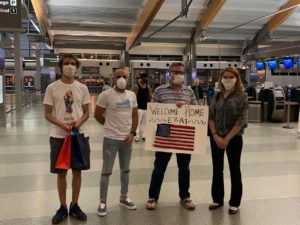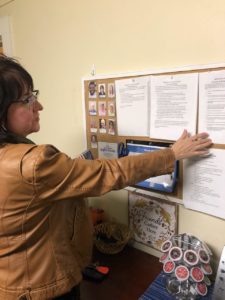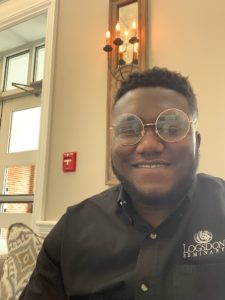The ministry of welcoming immigrants and refugees has not ground to a halt during the coronavirus pandemic, but it has changed shape.
“Our work hasn’t slowed down at all, even though the government is working to slow down new refugee arrivals and COVID has put a lot of stress on the process,” said Marc Wyatt, Cooperative Baptist Fellowship field personnel who, with his wife, Kim Wyatt, coordinates church-based refugee ministries in North Carolina’s Research Triangle and beyond.

Resettlement ministry volunteers wait to greet refugees.
Wyatt and others called to resettlement ministry said those hurdles are being met with creative and innovative approaches to being present for “the least of these.”
Their difficulties began in 2017 when the newly installed Trump administration started slashing the number of refugees who can be legally resettled in the United States. The cap was set at 18,000 for 2020. It had been around 100,000 in 2016.
Just as refugee resettlement ministers were adjusting to those dwindling numbers, the coronavirus hit the nation. The resulting social distancing, hygiene and cleaning requirements immediately impacted the Welcome House facilities operated by the Wyatts and partner churches.
Those units range from a small apartment building in Raleigh, N.C., to church-owned houses and other buildings converted to accommodate individuals and families adjusting to life in the United States.

Mark Wyatt (Photo/CBF)
The program welcomed its 400th guest in March — but only 19 since then.
“The houses aren’t closed,” Wyatt explained. “The numbers of guests are fewer, and the protocols are strict. We can’t control who comes in the country, but we can continue to be present.”
But present for whom? asked Cindy Hood, director of Welcome House Knoxville, a hospitality ministry serving East Tennessee in partnership with the Wyatts.
“At the beginning of the year, I was asking myself, ‘Who are we going to put in our house?’ There are no refugees.”
She got her answer quickly in January when an area church with a ministry for migrant workers contacted Hood about a Hispanic woman facing eviction. The woman had been injured on the job.
“She moved in with her son, and then the quarantine happened and she ended up staying through June,” Hood said. “We just gave her that space to relax a little and let God speak to her.”

Cindy Hood at Welcome House Knoxville.
The current residents at Welcome House Knoxville are an Iraqi family of seven in the U.S. legally for more than 10 years. They moved into the facility June 18 after fire destroyed their rental home. The unlikely-but-steady stream of residents, together with the support of local churches, is inspiring, Hood said.
“God has been really faithful. People have reached out through our website and called to say, ‘I know this pandemic is going on and we want to partner with you.’”
The dearth of refugees and the growing pandemic are inspiring in another way, said Sunny Ikojoh, a CBF Student.Go intern serving as the hospitality manager at Welcome House Knoxville.
“It’s teaching us to be fluid and flexible as much as we can, as we adjust to doing things differently every day,” said Ikojoh, a Nigerian who graduated from Hardin-Simmons University’s Logsdon Seminary.
In Raleigh, that flexibility has included expanding ESL courses — from 10 a week to 35 — by going virtual, Wyatt said. An initiative is being launched with partner agencies to address housing insecurity among previously settled refugees.

Sunny Ikojoh
Generosity also is on the rise from congregations and individuals concerned about the wellbeing of refugees and immigrants, he added. Financial and gift-card donations have spiked during the pandemic.
CBF North Carolina is considering making the Wyatts’ program a signature ministry to be adapted to meet the temporary housing needs of populations other than refugees around the state.
And the ministry is becoming more international. CBF Advocacy, CBF Global Missions and Fellowship Southwest are engaged in efforts to provide Welcome House-style housing to immigrants and asylum seekers along the U.S.-Mexico border. Cooperation is also occurring with refugee ministries in other nations.
“That kind of thing is happening across the country,” Wyatt said. “We are part of a network that extends into Canada and Australia and across the U.S.”
But it will remain a difficult ministry. “This (ministry) has become more of a national effort because of the continued drawdown, and the pandemic being used as an excuse to slow down arrivals,” Wyatt said.
